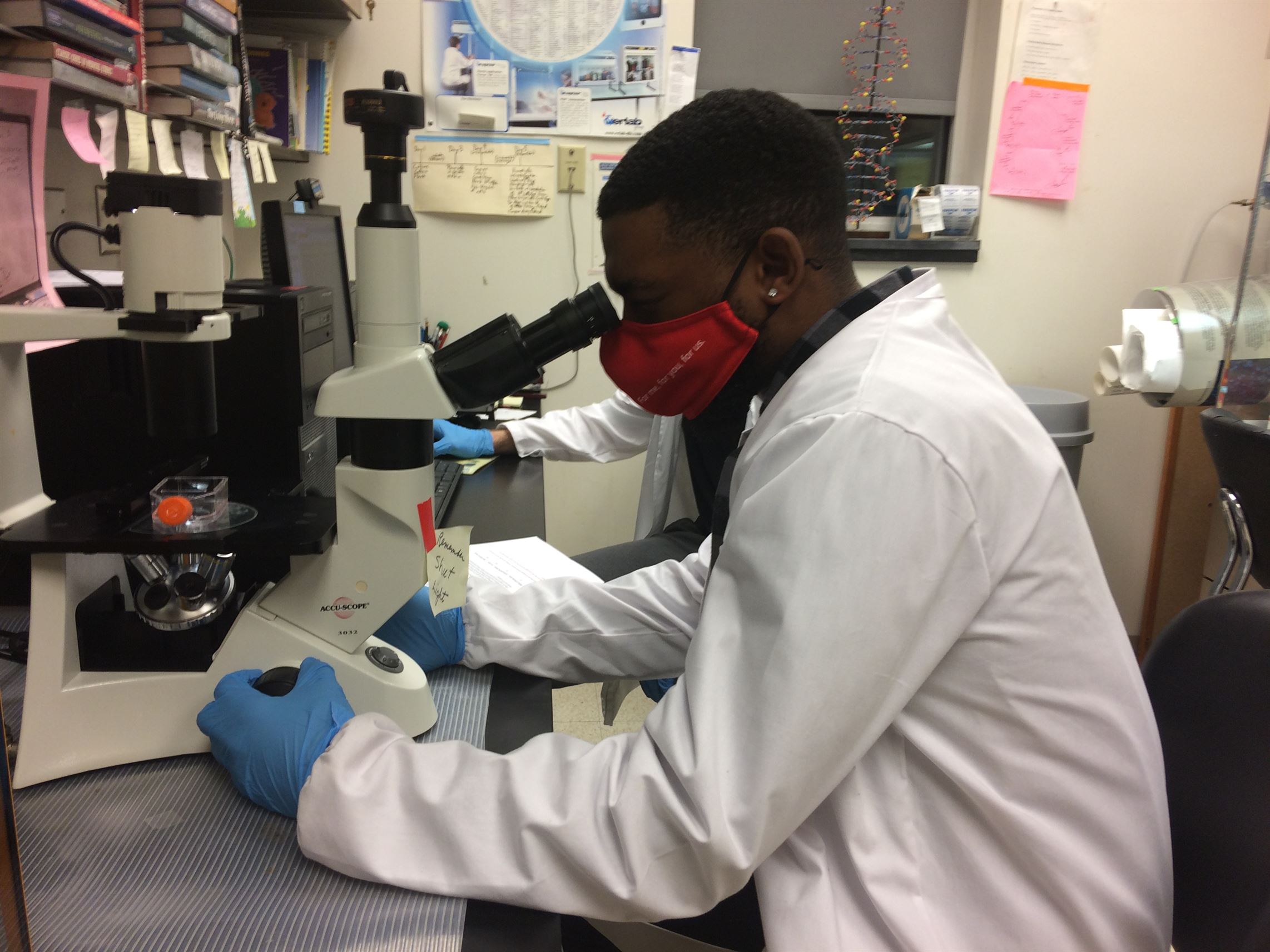Charles Ezenwanne leaned over and peered into the microscope, staring down at the petri dish in front of him. On the computer next to him, the screen showed several cells, all bunched together.
The cells that Ezenwanne, a senior molecular biology major, was looking at were lung cancer cells. Currently involved in a research project that studies how a natural arthritis supplement helps treat lung cancer patients, Ezenwanne has won numerous awards and grants to help fund his research.
The supplement Ezenwanne is studying is methylsulfonylmethane (MSM). Commonly used as a treatment to help osteoarthritis patients, recent studies have suggested that it helps reduce inflammation in cancer patients. The difference with this treatment, however, is that it is natural, Ezenwanne emphasizes.
“Many studies out there for cancers are [more focused on] pharmaceutical supplements, things that are synthetically made in the lab,” Ezenwanne said. “So, there’s not really much research out there regarding nutraceuticals, which are natural supplements, things that are found in foods that have benefits.”
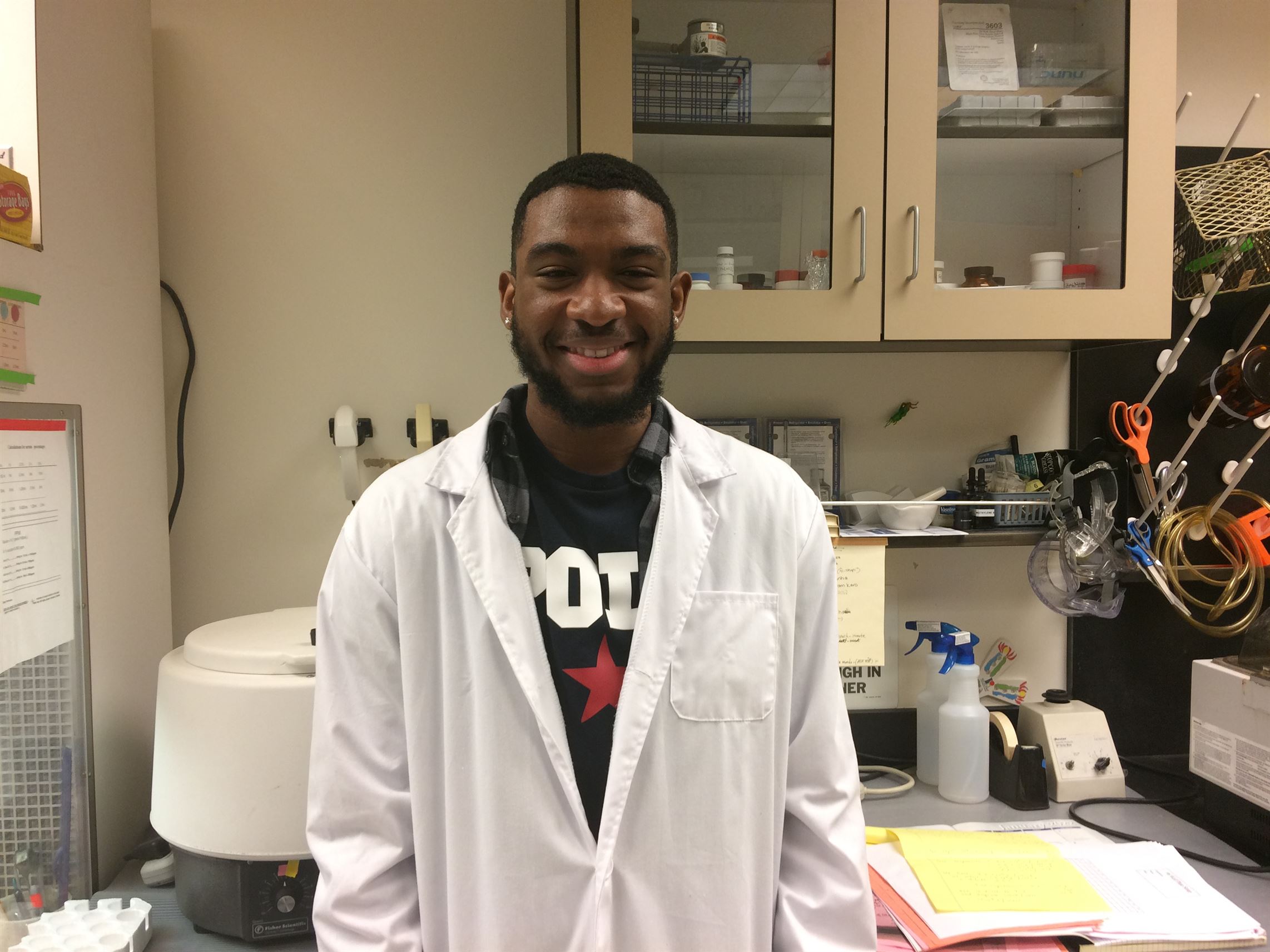
Charles Ezenwanne, a senior molecular biology major, has won many awards for his research around MSM and lung cancer.
Sal DiMaggio | The Montclarion
Through Ezenwanne’s research, he and his team are studying the molecular pathways, or chain reactions, that lung cancer cells go through when they interact with MSM. They can then share that knowledge with others so that further developments can be made in the world of cancer treatment.
Ezenwanne’s research proposal won him an award from the Wehner Student Research Program (WESTREP) here at Montclair State University, as well as a $5,000 award from the Promega Corporation. He also won an award from the Society of Toxicology (SOT), for which he’ll be flown out to California.
Ezenwanne came to the United States from Nigeria when he was five years old and is currently a New Jersey resident. The main reason why he and his family left was the contrast between the healthcare systems here in the United States and Nigeria.
“Coming from Nigeria, I did get really sick a lot,” Ezenwanne said. “And the healthcare system [there] really wasn’t as developed as it is [in the United States].”
Ezenwanne also raised awareness of the relations between finances and healthcare, something he is passionate about changing for everyone.
“We don’t have health insurance [in Nigeria], so things are paid out of pocket,” Ezenwanne said. “So, the more money you have, the better your healthcare is. So, that’s kind of the reason why I want to be a doctor and [why] I immigrated to America.”
Ezenwanne is also a member of both the Health Careers Program (HCP) and the Louis Stokes Alliance for Minority Participation (LSAMP) at Montclair State, which helps disadvantaged and underrepresented students succeed in STEM industries.
“Both of these programs are to promote awareness for minority students in the sciences,” Ezenwanne said. “So, I believe that my story [of] coming from a disadvantaged background [and] my initiatives to pursue a project at such an early career was the reason that I was able to win these awards.”
Ezenwanne’s team consists of his research partner Zachary Bonelli, a senior biochemistry major, and Dr. Ann Marie DiLorenzo, a Montclair State biology professor as well as Ezenwanne’s mentor since freshman year. Together, they form what they call a second family. Regarding DiLorenzo’s relationship with Ezenwanne, she called him one of her “academic children.”
Ezenwanne agreed.
“She’s like my second mom,” Ezenwanne said.
The two had met in Ezenwanne’s freshman year when he came to sit in on her tissue culture class, and over time, as DiLorenzo jokingly put it, she “couldn’t get rid of him.”
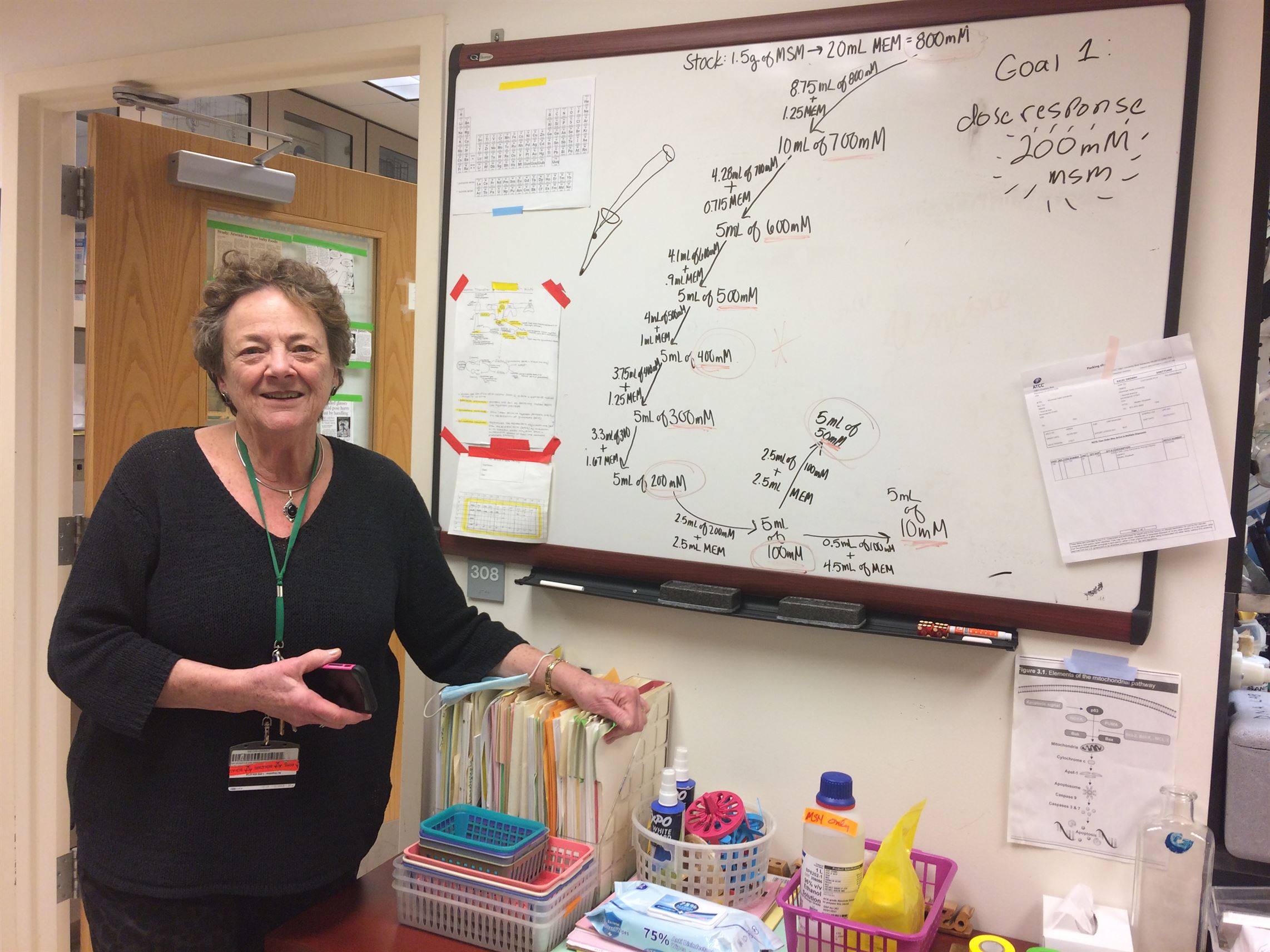
Dr. Ann Marie DiLorenzo, a professor in the biology department, has watched Ezenwanne’s progress over the years.
Sal DiMaggio | The Montclariion
DiLorenzo is confident that after watching Ezenwanne grow, he will achieve his professional goals, citing his passion and determination.
“I think he probably will have enough interest to do some research while in [the] medical [field], absolutely, which is a nice thing,” DiLorenzo said.
Ezenwanne and his colleague Bonelli also have a close bond.
“We were always in the front row [in freshman year], always answering questions that were asked and paying attention in the front,” Bonelli said. “[It got] to the point where you [would] look back [at the class] halfway through the year, after exam two, and nobody [was] left because they all failed already and we’re just in the front.”
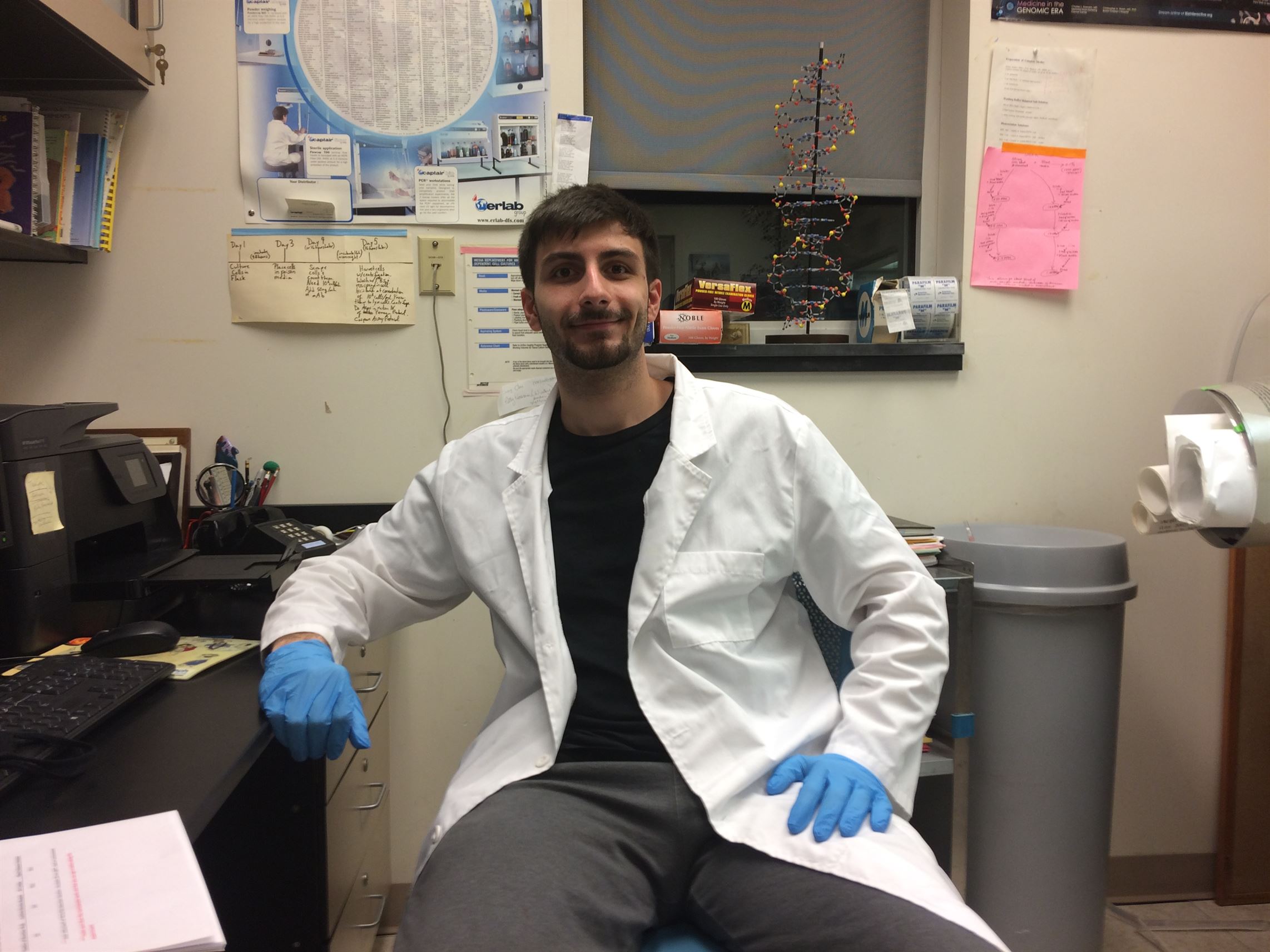
Zachary Bonelli is Ezenwanne’s research partner and right-hand man for this project.
Sal DiMaggio | The Montclarion
Bonelli further discussed the ways in which he assists Ezenwanne.
“I’m here to put my piece of mind into it and bounce ideas off of each other,” Bonelli said. “If there’s something that [Ezenwanne] doesn’t get about the numbers or something like that, I could just run through it and try my best, so we’ve been thinking [as a] team.”
Ezenwanne praised Bonelli for his help on the project.
“He’s basically been a gem, my right-hand man in the project,” Ezenwanne said. “Definitely wouldn’t have gotten this far without [Bonelli].”
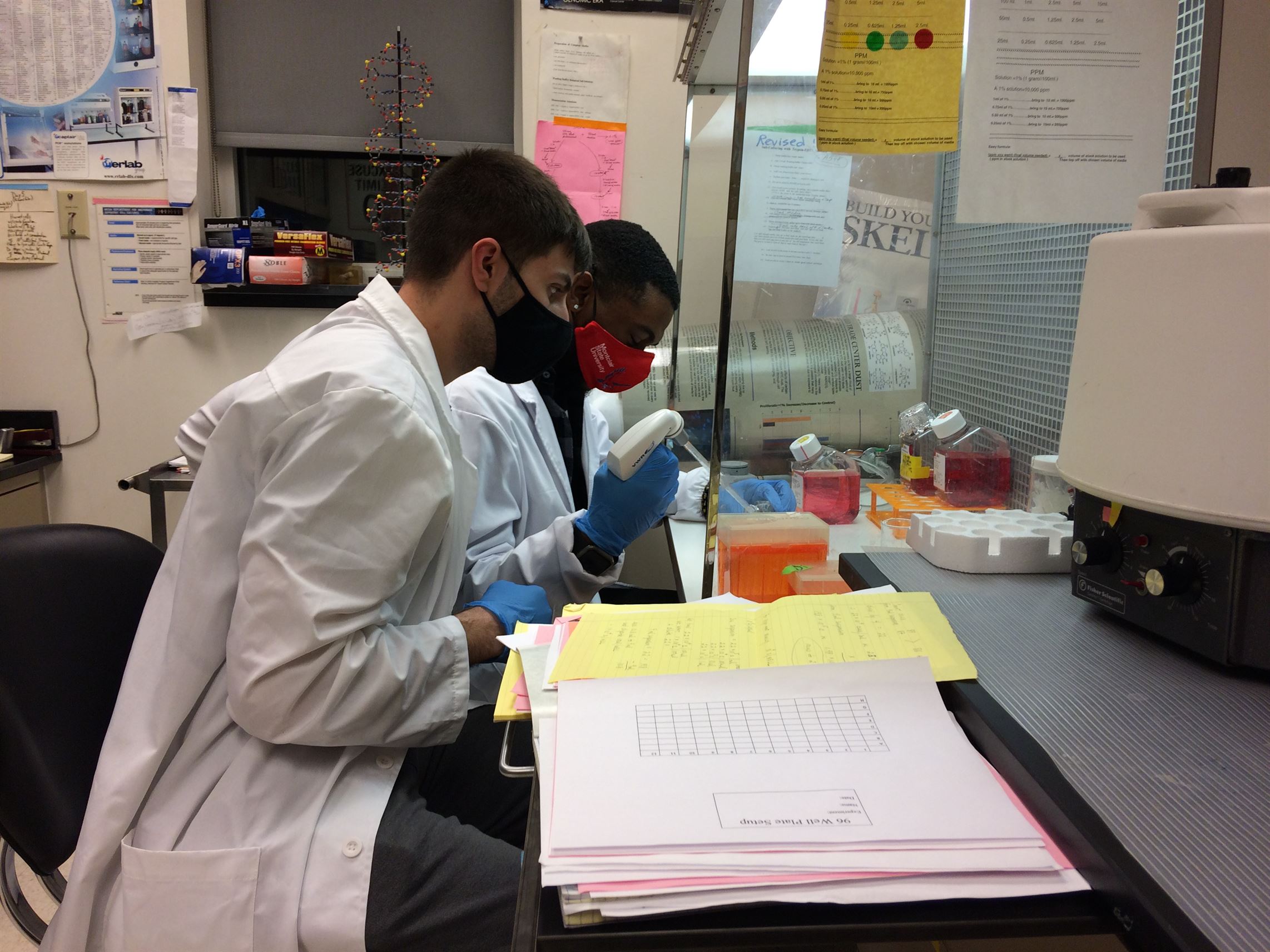
Bonelli (front) and Ezenwanne (back) study tissue samples in their lab in Science Hall.
Sal DiMaggio | The Montclarion
The team is still in the process of their research, but they plan on presenting their findings to the SOT and the American Society for Biochemistry and Molecular Biology (ASBMB).
Ezenwanne hopes his research will show other scientists a new way of developing cancer treatments and is hopeful for his future research.
“I would definitely like to have this project published for other scientists,” Ezenwanne said. “Once we find good results, other scientists can piggyback off of it and move into the direction that benefits cancer patients.”

